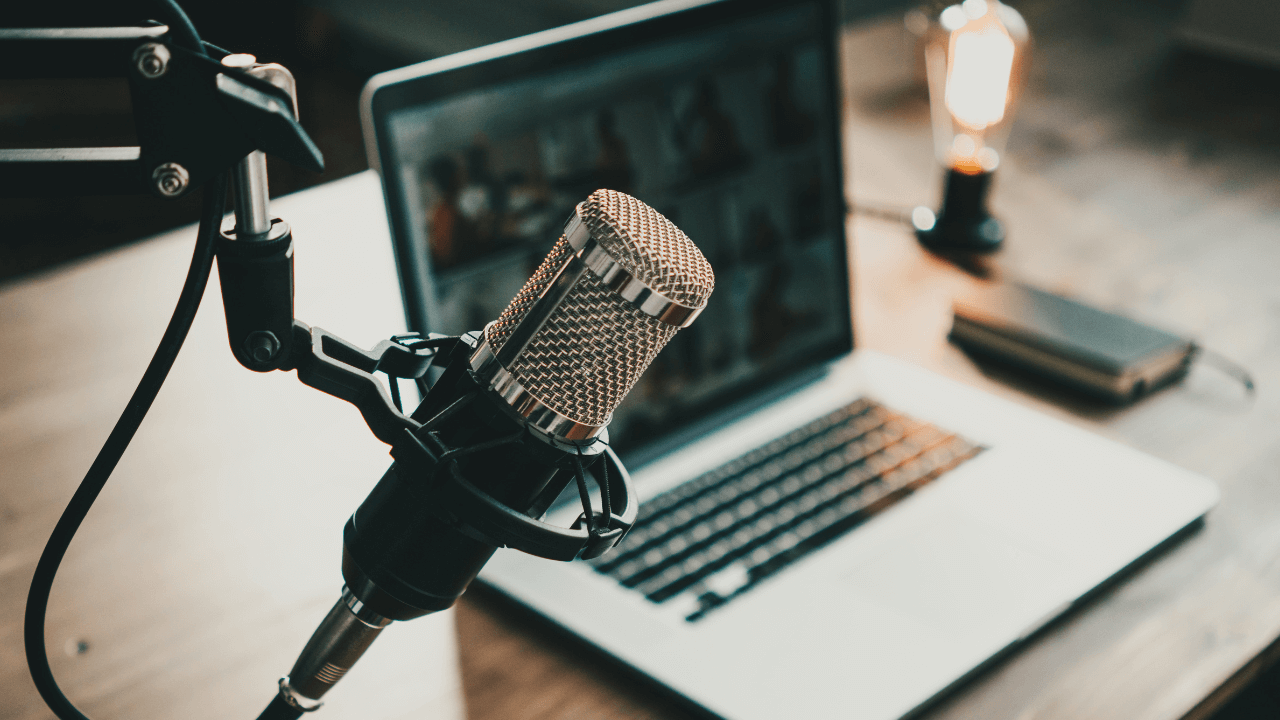
The podcasting industry has grown tremendously in recent years and shows no signs of slowing down.
Podcasts have become a cultural phenomenon that captivates millions around the globe and has become a mainstream form of entertainment and information consumption.
According to Edison Research’s Infinite Dial 2021 report, over half (55%) of the US population aged 12 years and above have listened to a podcast at least once.
The report also found that weekly podcast listenership has increased from 22% in 2018 to 28% in 2021.
As we stand on the brink of a new era in audio storytelling, it’s time to look ahead and explore how to make the most of this business opportunity.
Let’s buckle up and dive deep into the future of podcasting—a realm brimming with possibilities!
Oh, and by the way, we handhold our clients through their entrepreneurial journeys with the best-in-class support and tools for their business. Successful founders from across the globe have trusted doola for their U.S. company formation.
Sign up today to kickstart your dream U.S. business.
Why Did Podcasting Become So Popular?
The podcasting industry is booming, driven by an increasing audience, technological advancements, and changing consumer behaviors.
With more than 464 million active listeners on popular podcast platforms, there is no shortage of listeners for your podcast.
As people increasingly turn away from traditional media like television and radio, they seek alternative forms of entertainment that offer flexibility and convenience. Podcasts fit this need perfectly as they can be consumed anytime, anywhere.
They have become more appealing to advertisers due to their highly engaged audience.
According to Magna Global’s latest ad spend forecast, global podcast advertising revenues are expected to reach $2 billion by next year—a whopping increase from just $646 million in 2018.
Furthermore, monetizing podcasts has evolved beyond traditional advertising models with the emergence of paid subscription and membership models.
Platforms like Patreon and Supercast allow podcasters to offer exclusive content to their dedicated listeners for a fee, providing them with a steady source of income.
As we move into the future, it is clear that podcasts will continue to play a significant role in the media landscape and offer exciting opportunities for creators and advertisers alike.
Trend #1: Interactive Podcasts – A New Way to Engage with Listeners

Interactive podcasts go beyond traditional audio formats by incorporating interactive elements that allow for real-time participation from the audience.
This creates a more dynamic and immersive experience, making it easier for podcasters to connect with their listeners.
One of the most popular forms of interactive podcasts is live streaming, where hosts record episodes in front of an online audience. Listeners can tune in at a specific time and interact with the hosts through live chat rooms or social media platforms.
Another form of interactivity is through polls and surveys embedded into the show’s description or website.
This allows podcasters to gather valuable insights from their audience, which they can use to shape future episodes or content ideas.
Some podcasts also incorporate video elements into their episodes, allowing viewers to see visual aids or demonstrations while listening.
This adds another layer of engagement and makes it easier for audiences to understand complex topics or follow along with discussions.
Moreover, some interactive podcasts feature listener call-ins during recording sessions, creating an opportunity for direct communication between hosts and the audience. This interaction allows listeners to share personal experiences related to the episode topic or ask questions on air.
Interactive podcasts provide a unique and engaging experience for both podcasters and listeners.
They create a sense of community and foster deeper connections between hosts and their audience. As technology advances, we expect to see even more innovative ways to interact with podcasts.
Trend #2: Artificial Intelligence in Podcasting – Personalization and Content Creation
Artificial intelligence (AI) has been a game changer in various industries, and podcasting is no exception.
Recently, AI technology has been integrated into podcasting platforms to enhance personalization and content creation for creators and listeners.
Personalization in podcasting refers to tailoring the listening experience according to individual listeners’ preferences. This can include personalized recommendations, curated playlists, and targeted ads.
AI algorithms analyze listener data such as listening history, interests, and demographics to gain insights into their preferences.
This allows podcast hosting platforms to suggest relevant content that aligns with the listener’s interests.
For creators, AI-powered personalization tools can provide valuable data insights on their audience’s behavior. With this knowledge, creators can make informed decisions about future content and tailor it to their audience’s preferences.
In addition to personalization, AI is also revolutionizing content creation in podcasting. With advancements in natural language processing (NLP), AI can now transcribe audio recordings accurately and efficiently.
This eliminates the need for manual transcription services or spending hours editing transcripts for errors.
Furthermore, NLP technology also enables automated audio editing by identifying filler words or pauses in speech patterns that can then be edited out quickly.
This saves time for creators who would otherwise spend hours editing their podcasts manually.
Another exciting development is the use of AI-powered voice cloning technology that can enhance the capabilities of podcast mics even further.
Podcasters can now create virtual hosts using voice cloning software that seamlessly mimics human speech patterns and tones.
Moreover, there are even AI-powered tools that assist with scriptwriting by analyzing data from various online sources.
These tools aid in generating relevant ideas for podcast episodes and streamline the writing process for creators.
This opens up new possibilities for unique storytelling formats and creates more engaging conversations between hosts.
Trend #3: Virtual and Augmented Reality Integration in Podcasting

Virtual reality (VR) is a computer-generated simulation of a three-dimensional environment that can be interacted with using specialized electronic equipment.
On the other hand, augmented reality (AR) overlays digital information in the real world.
With the rise of virtual and augmented reality devices, there has been increasing interest in integrating these technologies into podcasting.
The most obvious way to integrate VR and AR into podcasting is to offer listeners a more immersive experience.
With VR headsets becoming more affordable and widely available, podcasts can now create 360-degree videos or animations to accompany audio content. This allows listeners to feel physically present in the scene being described.
Another potential use for VR and AR in podcasting is interactive storytelling.
A podcast episode can feature a choose-your-own-adventure style narrative in which listeners make decisions that affect the story’s progress.
This would add another layer of engagement for listeners, making them feel like they are part of the story rather than just listening to it.
Moreover, AR technology could enhance educational podcasts by overlaying visual aids or additional information onto real-world objects.
For example, a history podcast about World War II could use AR to show maps or images of specific events while the listener listens to narrations.
Despite its potential benefits, incorporating VR and AR into podcasting presents challenges.
The technology is still relatively new, so there may also be limitations regarding software development tools and resources available for podcasters to create VR/AR content.
Trend #4: New Monetization Strategies for Podcasters
Podcasters need to find effective ways to generate revenue to sustain their venture and continue creating high-quality content.
Therefore, monetization is one of the most watched spaces since it has become increasingly important for the industry to grow and evolve.
Sponsorships are among the most common methods podcasters use to monetize their shows. This involves partnering with a brand or company that aligns with the values and interests of the podcaster’s audience.
The podcaster then promotes the sponsor’s product or service during their show in exchange for payment.
So, the podcaster gets paid for promoting a product they believe in, while the sponsor gains access to a targeted audience through an established platform.
Like sponsorships, affiliate marketing also involves promoting products or services on your podcast.
However, instead of receiving a flat fee from sponsors, affiliate marketing allows you to earn a commission for every sale made through your unique referral link.
This method can be incredibly lucrative if you have a dedicated, engaged audience who trust your recommendations. You must only promote products or services that align with your brand and add value to your listeners’ lives.
Offering premium content or membership programs is another popular monetization strategy for podcasters. This can include bonus episodes, exclusive interviews, behind-the-scenes content, and more.
Crowdfunding platforms like Patreon allow listeners to support their favorite podcasts through monthly donations. In return, supporters may receive perks such as early access to episodes, exclusive merchandise, or personalized shoutouts on the show.
This strategy works well for podcasters with a dedicated fan base who want to support their work and help them continue creating content.
Before pursuing any strategy, it is important to establish yourself as an authority in your field and ensure that there is a demand for the course or coaching you plan to offer.
Trend #5: The Influence of Big Data on Podcasting
With its rising popularity, podcasting constantly evolves and adapts to new technologies. One such technology that has significantly impacted the world of podcasting is Big Data.
Big Data refers to the large sets of complex data that are collected, analyzed, and utilized to make informed decisions. In podcasting, this data includes listener behavior and engagement metrics such as downloads, plays, and subscriptions.
One major influence of Big Data on podcasting is its role in content creation.
Podcasters can gain insights into their audience’s preferences and interests by analyzing listener data. This allows them to tailor their content and create episodes that are more likely to engage listeners.
Moreover, Big Data has also significantly improved podcast discoverability. With millions of podcasts available across various platforms, it can take time for new or lesser-known shows to gain traction among listeners.
However, with the help of data-driven algorithms used by streaming services like Spotify and Apple Podcasts, shows can now reach more relevant audiences based on their listening history and preferences.
Another aspect where Big Data has made an impact is podcast advertising.
As many shows rely on sponsorships for revenue generation, advertisers look at data analytics when choosing which podcasts to advertise or determining ad placement within episodes based on listener demographics.
Big Data is one of the most vital tools that significantly influenced podcasting, from content creation and discoverability to advertising opportunities.
As technology advances, the role of Big Data in shaping the future of podcasting will only continue to grow.
Future-Proof Your Podcasting Business with doola

The future of podcasting looks bright and promising. With new technologies and trends emerging, we expect this medium to continue gaining traction and becoming an integral part of our daily lives.
So whether you are a listener or a content creator, there has never been a better time to be a part of the podcasting world.
However, podcasters must ensure that their businesses are legally sound and compliant from the start. This is where doola comes in.
One key aspect of future-proofing your podcasting business is ensuring it is appropriately formed and registered as a legal entity.
This protects your personal assets and presents a more professional image to potential partners and sponsors.
Our business formation services can help you select the appropriate business structure, such as an LLC or corporation, and handle all the necessary paperwork to establish your business.
In addition to formation services, doola also offers ongoing compliance support. With doola’s compliance services, you can rest assured that your business will remain in good standing with state and federal agencies.
Moreover, doola’s offerings include tax planning and preparation since it can be a new and uncharted territory for many podcasters.
Consult our CPA team, who have vast experience working with small businesses and ensuring proper tax classification and filing processes are followed.
Our proactive approach to business formation and compliance will save time and stress in the long run and allow your podcasting business to thrive in a constantly evolving industry.



